Analysis
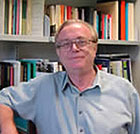 |
THE CRISIS IN TIMOR-LESTE: IS THERE A PATTERN?by Dr Dennis Shoesmith, dennis.shoesmith@cdu.edu.au Faculty of Law, Business and Arts, Charles Darwin University. Dr Shoesmith's current research interests are the forthcoming national elections in East Timor and capacity-building in social research in East Timor |
| States riven by conflict must be understood in terms of their own, unique histories. At the same time, there are patterns of state failure and conflict that can help clarify why states collapse into violence and anarchy. The crisis in Timor-Leste fits a pattern of renewed conflict in post-conflict states.
With this legacy of violence, Timor-Leste displays the common variables that, according to Collier et al, make rebellion feasible: a very low per capita income, a stagnant economy, and (recently) large exports of natural resources. They single out Timor-Leste as in ‘a much more alarming situation than Bosnia [was], all things being equal’. It is the feasibility of rebellion, rather than the motivation of the political actors, they argue, that provokes civil wars: ‘where insurrection is feasible, it will occur’. In this sense, the violence in Timor-Leste was the result of various groups?rebellious soldiers, ‘easterners’ and ‘westerners’, criminal gangs?taking opportunistic advantage of the collapse of state authority. They claim that democratic post-conflict states have double the risk of autocratic states of experiencing further major conflict. |
According to this argument, had the Fretilin leadership imposed an autocratic, one-party regime, they would have diminished the likelihood of open conflict. While post-conflict elections reduce the risk of violence in the election year, they actually increase the risk in the following year. Elections in Timor-Leste are scheduled for 2007. If the pattern holds, 2008 could be a very dangerous year. The Fretilin government has spent a relatively high amount on security, confirming another variable. Heavy military spending in post-conflict states increases rather than decreases risk of conflict. Because it could not rely on the loyalty of the army, the government created a 3,500 strong police force, arming it with serious military hardware. Rebellion and violence between army and police provoked the wider conflicts of May-June. Clearly the United Nations Transitional Administration in East Timor (UNTAET) was in place for far too short a time. The comparative data suggests risk of serious conflict remains high for the first four to six years after the initial conflict. Sukehiro Hasegawa, the present Special Representative of the UN Secretary-General in Dili, concedes that the UN left East Timor when the security situation remained ‘fragile and fluid’.
In the long-term only economic recovery and growth will dramatically reduce risk of further major conflict. The good news is that Timor-Leste has the natural resources to achieve this, but only if the oil and gas revenues are managed intelligently. |
Links:
|

AUSTRALIA'S VIETNAM DECISION AND LESSONS ON GOING TO WARby Garry Woodard, Senior Fellow in Political Science, University of Melbourne, former senior diplomat and author of Asian Alternatives: Australia's Vietnam Decision and Lessons on Going to War, Melbourne University Press http://www.mup.unimelb.edu.au/ebooks/0-522-85143-6/index.html |
| Under a strong Foreign Minister, however things could be different, as was evident during Garfield Barwick’s term as External Affairs Minister from December 1961 to April 1964. Barwick based his foreign policy on the convictions that:
Barwick was the most powerful Australian foreign minister in the last half century. His cooperation with his officials represented the Westminster ideal and best practice in foreign policy. If Barwick had remained, as he wished, Foreign Minister for another
year before becoming Chief Justice, Australia would not have rushed
into combat in Vietnam. |
This ‘counterfactual’ rests on more solid reasoning than the popular hypothesis that if Oswald had missed, John F Kennedy would have kept the United States out of war in Vietnam.
Before the secret December decision, Cabinet sought only military advice; External Affairs officials were frozen out. They would have urged caution and argued that Australia’s highest priority was closer to home, dealing militarily and diplomatically with Sukarno’s expansionist Indonesia. Vietnam was not ‘the diplomats’ war’, as often alleged, but war made by politicians, abetted by generals. Links:
|

Profile
|
This month we feature the Asia-Pacific editor of
The Sydney Morning Herald, Hamish Mcdonald
(hmcdonald@smh.com.au) who
has spent over 20 years of his career in journalism working in Asia. |
||
|
Q: What are your current preoccupations? |
I find myself mentally barracking for India (and its democracy and pluralism) but you have to admit the Chinese have got their act together. Q: How do these fit into the contemporary scene? Q: What are your hopes for Asian studies in
Australia? |
|

Graduate of the month
|
Valerie grew up in Far East Russia. She studied at the University of Culture and Art in Khabarovsk and in 1996 completed a Masters of Business Management. With this qualification she went to work for a recruitment company in Qingdao in northeast China. China was not entirely foreign to her: she studied Chinese at high school and had been over the border to Harbin for sightseeing trips. Valerie loved her time in Qingdao. The job was challenging: organising the recruitment of Russian workers for the hospitality industry, |
dealing with government departments, arranging visas, sorting out accommodation, and finding places of work. Living in Qingdao was also good. The people were very friendly; the beach was close by and the shopping was great. The Chinese company Valerie worked for sponsored her to study Chinese at Guangbo Xueyuan, the Beijing Film and Television School. She found learning Chinese difficult yet fascinating, and a way to improve her cross-cultural understanding and tolerance. Valerie is now a corresponding member of the China Studies Association of Australia, an affiliate of the ASAA (http://www.csaa.org.au/council.html) Valerie came to Australia in 1999 and resumed her study, this time doing a diploma in Human Resources and Business Management at the Canberra Institute of Technology. She also began working as a recruitment officer at the Australian National University and in 2003 entered the University’s graduate recruitment program. As well as her present job at ICEAPS she is studying web development, believing it is important to keep up with the latest trends in this fast-changing field. |

Website of the month
| http://tinyurl.com/msdag |
Recent article of interest
|
Former Malaysian Prime Minister, Mahathir Mohamad, has been
levelling public criticism at the Malaysian government ever since leaving
office. Yang Razali Kassim, a senior fellow with the Institute of Defence
and Strategic Studies at Nanyang Technological University asks what
will be the long-term impact for Malaysian politics? Given the present
incumbent’s inclination to avoid a destructive collision, he concludes
that for the time being tensions in UMNO can be contained. See Bend
it Like Bamboo http://www.tcsdaily.com/article.aspx?id=071206A
|

Did you know?
|
There are two new books out in the ASAA’s Southeast
Asia Publication Series (SEAPS) edited by Professor Howard Dick (University
of Melbourne): Other Malays: Nationalism and Cosmopolitanism in the Modern Malay World by Joel S. Kahn, which examines the powerful linkages between ethnicity, religious reform, identity and nationalism in multi-ethnic Southeast Asia. Click on this link and you get 20% off the regular price. http://www.unireps.com.au/isbn/9971693348specd.htm Anti-Chinese Violence in Indonesia, 1996-1999
by Jemma Purdey which analyses the main incidents of violence during
the transitional period between 1996 and 1999 and the unprecedented
process of national reflection that followed.
Click on this link and you get 20% off the regular price.
http://www.unireps.com.au/isbn/9971693321specd.htm |

Diary dates
|
ASIA ON MY MIND, 26 July 2006, Sydney. Michael L’Estrange, Secretary of the Department of Foreign Affairs and Trade will speak at a dinner organised by the Asia Society at the Australian Club, 165 Macquarie Street. For details contact Daphanie Teo, daphaniet@asiasoc.org.au BORNEO IN THE NEW CENTURY, 31 July and 1 August 2006, Kuching Sarawak. Papers are invited for the Eighth Biennial Conference of the Borneo Research Council (BRC). These should present original research in any field relating to Sabah, Brunei, Sarawak, Kalimantan and its surrounding region. Abstracts, no longer than 100 words, must be submitted by email before 1 May to: Jchin@ieas.unimas.my or James.chin@lycos.com For more details, see: www.borneoresearchcouncil.org
ENGAGING WITH INDIA—A NEW MODEL, 3 August, Melbourne. Professor Richard Larkins, Vice Chancellor and President of Monash University will speak at the Asia Society’s CEA Asia Update Luncheon. For details contact Daphanie Teo, daphaniet@asiasoc.org.au ICT IN ASIA AND AUSTRALIA: UNDERSTANDING TRENDS AND OPPORTUNITIES, 1 August, Melbourne. A half day event sponsored by Asialink at the University of Melbourne. See www.asialink.unimelb.edu.au for full program and registration details RECONCILIATION BETWEEN JAPAN AND CHINA, workshop, August, Canberra. In August 2006, the Department of International Relations at the Australian National University will host a workshop as the culmination of online discussion about the best ways to encourage reconciliation between Japan and China. The objective is to produce concrete and realistic policy proposals for enhancing security cooperation between the two Asian powers, especially with respect to their participation in the Six Party Talks on the North Korean nuclear issue and in the potential East Asian Community. See www.china-japan-reconciliation.blogspot.com ASIA-PACIFIC MISSIONARIES: AT HOME AND ABROAD, 2nd biennial conference, 25-27 August 2006, Canberra. The conference will be held at the Coombs Lecture Theatre, Australian National University, Contact: Dr Ian Welch, ian.welch@anu.edu.au
|
CELEBRATE
AUSTRALIA, AUSTRALIAN STYLE in Shanghai, 21-28 October. Set
at Shanghai's famous lifestyle, entertainment and boutique retail venue
Xintiandi, Celebrate Australia will feature a week long program of unique
activities and promotions spotlighting the finer side of Australian
expertise, lifestyle and innovation. The week coincides with several
other high profile events in Shanghai, including the Australia China
Business Council’s 2nd Forum in Shanghai on 25 October and the
Australian Ballet performing 'Swan Lake' from 27-30 October. Australian
companies are invited to apply to participate in this celebration by
registering by 11 August. See specific mission service packages provided
by Austrade: http://www.austrade.gov.au/corporate/layout/0,,0_S1-1_CORPXID0040-2_-3_PWB110830402-4_-5_-6_-7_,00.html
or contact THIRD WORLD CONGRESS OF KOREAN STUDIES, 27-30 October 2006, Jejudo island, South Korea. The theme of the largest Korean studies conference in the world is 'Cultural Interaction with Korea: From Silk Road to Korean Wave'. For further information, see http://www.aks.ac.kr/eng_home
MEDIA: POLICIES, CULTURES AND FUTURES IN THE ASIA PACIFIC REGION, 27-29 November, Perth. Call for papers: deadline 31 July 2006 The organisers of the 2006 Signature Event conference for the Australia Research Council's Asia Pacific Futures Research Network (APFRN), organised by the Media-Asia Research Group welcome proposals for individual papers as well as workshops and panels from government, industry and community groups in addition to the academic community. See http://www.MediaAsiaConference.humanities.curtin.edu.au. A limited number of scholarships are available (deadline 30 June).
WORLD WITHOUT WALLS: 21st Century Perspectives on East and West, 3-7 December 2006, Sydney. The Oriental Society of Australia (OSA) is holding a fiftieth anniversary, international conference from 3-7 December. The conference title ‘World Without Walls’ reflects the belief of the conference organisers that the study of humanities, the arts and social sciences without Asia is incomplete. The conference is designed to break down traditional geographic country-based studies by organising panel discussions thematically, and bringing together scholars from different backgrounds to discuss common problems. University of Sydney; COST: $380 per person ($300 Early Bird Registration) ENQUIRIES: OSA2006 Conference Committee, OSA2006@arts.usyd.edu.au. See http://www.arts.usyd.edu.au/conference/OSA2006 |

You are welcome to advertise Asia-related events in this space. Send details to: fbeddie@ozemail.com.au
Feedback
What would be useful for you? Human interest stories, profiles of successful graduates of Asian studies, more news about what's on, moderated discussions on topical issues? Send your ideas to fbeddie@ozemail.com.au
About the ASAA
The Asian Studies Association of Australia (ASAA) promotes
the study of Asian languages, societies, cultures, and politics in Australia,
supports teaching and research in Asian studies and works towards an understanding
of Asia in the community at large. It publishes the Asian Studies Review journal
and holds a biennial conference.
The ASAA believes there is an urgent need to develop a strategy to preserve,
renew and extend Australian expertise about Asia. It has called on the government
to show national leadership in the promotion of Australia’s Asia knowledge
and skills. See Maximizing Australia's Asia Knowledge Repositioning and Renewal
of a National Asset http://coombs.anu.edu.au/SpecialProj/ASAA/asia-knowledge-book-v70.pdf
Asian Currentsis published by the Asian Studies Association of Australia (ASAA) http://coombs.anu.edu.au/ASAA/ thanks to a grant from the International Centre of Excellence for Asia Pacific Studies (ICEAPS) http://iceaps.anu.edu.au. It is edited by Francesca Beddie. The editorial board consists of Robert Cribb, ASAA President, Michele Ford, ASAA Secretary, Mina Roces, ASAA Publications officer, Tamara Jacka, ASAA Council member.

 A
recent study of post-conflict risk (Collier, Hoeffler and Södebom)
provides an excellent comparative analysis. Of a sample of 68 post-conflict
states, 31 reverted to war, an average risk of 46 per cent. Given that
Timor-Leste at independence had suffered both a civil war from 1975
and major violence and destruction in 1999, by 2002 the level of risk
of further conflict was probably even higher than this.
A
recent study of post-conflict risk (Collier, Hoeffler and Södebom)
provides an excellent comparative analysis. Of a sample of 68 post-conflict
states, 31 reverted to war, an average risk of 46 per cent. Given that
Timor-Leste at independence had suffered both a civil war from 1975
and major violence and destruction in 1999, by 2002 the level of risk
of further conflict was probably even higher than this.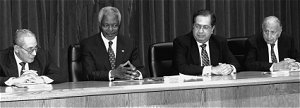

 Writing
in 2002-03 of Australia’s involvement in the Vietnam war, I was
struck by the parallels with Australia joining the ‘coalition
of the willing’ in Iraq. Both operations revealed a conservative
mindset of astonishing durability. I found little evidence that the
lessons of Australia’s flawed involvement in Vietnam had been
learnt and saw little prospect of the conflict in Iraq bringing any
advantage to Australian interests.
Writing
in 2002-03 of Australia’s involvement in the Vietnam war, I was
struck by the parallels with Australia joining the ‘coalition
of the willing’ in Iraq. Both operations revealed a conservative
mindset of astonishing durability. I found little evidence that the
lessons of Australia’s flawed involvement in Vietnam had been
learnt and saw little prospect of the conflict in Iraq bringing any
advantage to Australian interests. The
decision to join the Vietnam war was taken in December 1964, earlier
than usually thought, and reveals the Prime Minister’s dominant
influence. Menzies believed that ‘everything we put beside the
Americans is good in the common interest’. In contrast, another
strong anti-Communist, Lee Kuan Yew, opined that ‘the price
[for American protection] is really rising’. Neither Singapore
nor any other Asian country put troops into Vietnam until the US agreed
to subsidise them.
The
decision to join the Vietnam war was taken in December 1964, earlier
than usually thought, and reveals the Prime Minister’s dominant
influence. Menzies believed that ‘everything we put beside the
Americans is good in the common interest’. In contrast, another
strong anti-Communist, Lee Kuan Yew, opined that ‘the price
[for American protection] is really rising’. Neither Singapore
nor any other Asian country put troops into Vietnam until the US agreed
to subsidise them. Q:
When did you become interested in studying Asia and why?
Q:
When did you become interested in studying Asia and why? Valerie
Shavgarova
Valerie
Shavgarova 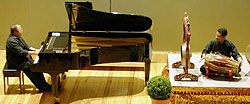 'PUNAKAWAN
QUARTET' concert, 1 August, Sydney. Indonesian pianist, Jaya
Suprana, will lead this free concert of Sufi music organised by the
Indonesian Department of New South Wales University in cooperation with
the Indonesian Consulate General in Sydney. 6pm to 8pm, Clancy Auditorium,
UNSW (entry via Gate 9, High Street, Kensington)
'PUNAKAWAN
QUARTET' concert, 1 August, Sydney. Indonesian pianist, Jaya
Suprana, will lead this free concert of Sufi music organised by the
Indonesian Department of New South Wales University in cooperation with
the Indonesian Consulate General in Sydney. 6pm to 8pm, Clancy Auditorium,
UNSW (entry via Gate 9, High Street, Kensington)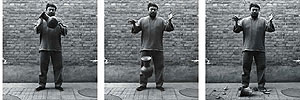 ASIA-PACIFIC
TRIENNIAL OF CONTEMPORARY ART, December 2006, Brisbane. The
Asia-Pacific Triennial of Contemporary Art (APT) will be the opening
exhibition at the new Queensland Gallery of Modern Art. APT 2006 will
present the work of over 30 artists from Asia, Australia and the Pacific.
It will feature a performance and cinema program, as well as a children’s
festival. See
ASIA-PACIFIC
TRIENNIAL OF CONTEMPORARY ART, December 2006, Brisbane. The
Asia-Pacific Triennial of Contemporary Art (APT) will be the opening
exhibition at the new Queensland Gallery of Modern Art. APT 2006 will
present the work of over 30 artists from Asia, Australia and the Pacific.
It will feature a performance and cinema program, as well as a children’s
festival. See 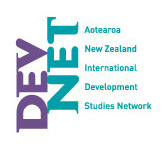 THE
AOTEAROA NEW ZEALAND INTERNATIONAL DEVELOPMENT STUDIES NETWORK CONFERENCE
30 November to 2 December 2006, Dunedin. The conference is
entitled ‘Southern Perspectives on Development: Dialogue or Division?’
is to be held at the University of Otago, Further information is available
from
THE
AOTEAROA NEW ZEALAND INTERNATIONAL DEVELOPMENT STUDIES NETWORK CONFERENCE
30 November to 2 December 2006, Dunedin. The conference is
entitled ‘Southern Perspectives on Development: Dialogue or Division?’
is to be held at the University of Otago, Further information is available
from